Saving Private Ryan @ 25: Robbed or Not?
 Tuesday, July 25, 2023 at 1:18PM
Tuesday, July 25, 2023 at 1:18PM As Oppenheimer enjoys tremendous success worldwide, another World War II movie turned summer blockbuster celebrates a quarter century. Though, of course, while Christopher Nolan's movie ponders history away from the battlefield, Steven Spielberg drops the viewer in the middle of carnage, violence smeared on your face until you can't take it anymore. Yes, it's been 25 years since Saving Private Ryan opened in cinemas, receiving immediate critical acclaim and frontrunner status by the awards pundits at most major publications. Come Oscar night, though, the war story took 'only' five awards. It lost the Best Picture trophy to Shakespeare in Love in an upset that angers many people to this day.
To mark the anniversary, let's celebrate the film's undeniable qualities, investigate some of its drawbacks, consider its competition at the 71st Academy Awards, and relitigate the controversy. Was Saving Private Ryan robbed? Well…
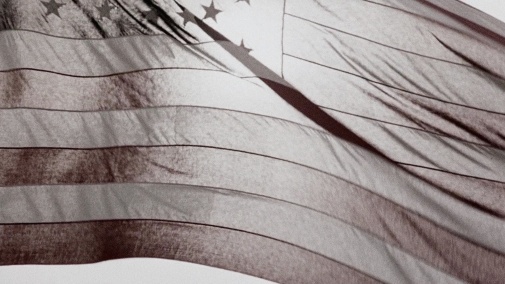
An American flag flaps in the wind, backlit into graphic array of black lines across the sun, an image of patriotism drained of red, white, and blue. In this singular vision, Spielberg seems to propose an exercise honoring American history while stripping it of romanticism. He and his crew valiantly erase nostalgia from bellicose memories to honor the men who fought in World War II. At the same time, however, the pull of sentimentalism will contradict that purpose as the film unfolds, never more than in the framing device this flag shot introduces. It's set in the Normandy Cemetery, around what one presumes was 1998, following an aged veteran as he pays tribute to his fallen brothers.
Whatever aesthetic mission Spielberg might showcase in the main action is absent at the margins, especially apparent in the meaning produced by the first transition to the past and the music underscoring it all. Simply put, John Williams was at the peak of his martial craze when he composed the score, combining the symphonic sentimentality of his usual fare with a militarist drive. The music is a propulsion of remembrance, embalming what's to come in signifiers that betray harsh truth – a melodic manifestation of Jingoistic nostalgia for the Greatest Generation. Thankfully, the schmaltz doesn't last long, the movie diving into a reality without song. It's time for the present dream to give way to past nightmares.
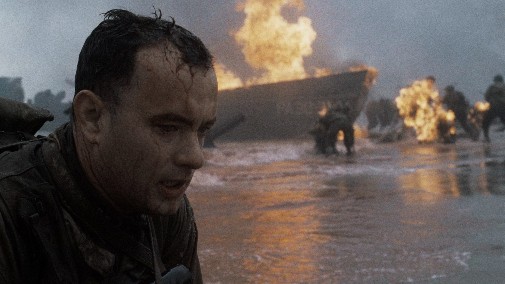
At over 20 minutes, the D-Day sequence at Omaha Beach is a perfect short film that encapsulates the best of Spielberg's craft, given a spin away from classicism. The director manages the chaotic violence like a conductor does their orchestra - notice the modulations of sound and tempo, how color thrills its own aria in plumes of red emerging within grey. In the midst, silence sings serene and crucial, as does the visual obstruction of objects, awkward angles, the elements revolting against celluloid like angry Gods of Old. It's a whirlwind of glorious grain, cinematic invocation doing double duty as a masterclass for audiovisual immersion.
The diabolic magic of it all is in how the filmmakers turn an experience always seen through the distance of historical document into a jolt of potent immediacy. Maestro Spielberg was in sublime form here, showcasing his ability to compose striking imagery while moving the camera through the scene. But that might be the movie's Achilles' Heel, even more damaging than the narrative frame. By delivering such a compact masterpiece early on, the director condemns the rest of the movie to cruel comparison – no matter how good the remaining hours of Saving Private Ryan may be, they never match the perfect Pandemonium of this opening salvo.
Moreover, there's an implicit attack on character-based drama within these movements, introducing bodies instead of personalities. Early on, Spielberg revolts against the war picture as winsome elegy, as a comforting institution that dares not question its basic tenets. No matter how kinetic he might make the sequence, it's never fun in the traditional sense, achieving a sort of punitive gravitas that dares the viewer to fall back into rosy notions of noble sacrifice. Then, it's over, and we're in the realm of Rockwellian Americana to set up the actual story, a direct contradiction of sorts.
In one gesture, Spielberg proposes a denial of romanticism. On the other, he can't help but indulge in it. Such discrepancies, creative impulses crashing in opposite directions, are part of what makes him a great filmmaker. In this case, they betray the work, dooming it to incoherence. That said, declaring Saving Private Ryan a failure would be a lie. The imperfections make it a more exciting piece to study and revisit than it might have been with a better script and other not-so-minor matters. Not to mention that, formalistically, the thing's a miracle full of radical strategies that still shock after decades of lesser imitators.
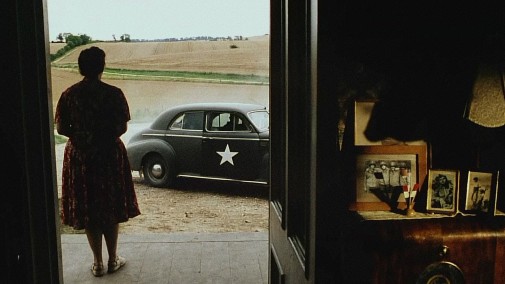
Cinematographer Janusz Kamiński has been with Spielberg since Schindler's List, and he's become something of a hindrance in the past few years, his style so inflexible as to be stifling, even when it's gorgeous to behold. By the time they made Saving Private Ryan, however, the erstwhile Mr. Holly Hunter was still open to experimentation, adapting to each new movie's demands, its possibilities. That's how we get this photographic triumph, which goes for hyper-realism before soaring above, reaching a state of utmost subjective agony. The sound is even better, caustic and nauseating, defining the physical parameters of every set piece until you believe you're trapped in there with the soldiers.
Oh, if only those men weren't so clichéd despite the efforts of a game cast. If only Spielberg could prolong the moral ambiguity of battle into the action interstitials. If only we could have stayed in the aftermath of bloody combat, forever stuck in painful memory. But no, the audience and the film must return to the framing device, to confront Saving Private Ryan's objectionable side. Pardon the grumblings, but I don't think acknowledging my problems with the movie erases its strengths, nor would it be right to feign a love I don't possess. Regarding 1998 Best Picture-nominated WWII movies, I'll take Terence Malick's The Thin Red Line, thank you very much.
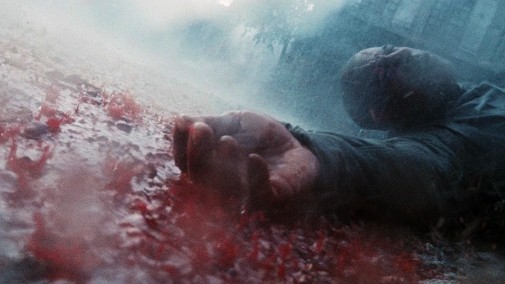
I'll go as far as saying that the Pacific Front poem is the true robbed queen among the nominees. What's more, Spielberg's Oscar bounty feels relatively fair for the film in question. The sound awards were rightly won, and it's hard to argue with Michael Kahn's editing when the structural issues are mostly script-based. Kamiński won Cinematography against The Thin Red Line's John Toll, which, while debatable, still seems eminently justifiable. The same goes for Spielberg's second Best Director win. Did it deserve more? I don't think so, though you might disagree. Looking over the categories it lost, other contenders seem superior.
Makeup went to Elizabeth, the queen's iconographic evolution trumping battlefield gore. Williams's score was the lesser of the five nominees, losing to Nicola Piovani's gorgeous Life Is Beautiful compositions. Tom Hanks also lost Best Actor to the Italian movie, and although I consider the American actor a better choice, he was far from being the lineup's standout – justice for Ian McKellen and Edward Norton! But then we have the other three races, and the matter grows uglier. Shakespeare in Love won Art Direction, Original Screenplay, and Picture against Saving Private Ryan, that last one a relative upset.
The causes for that are varied, but they fall primarily on one name, the elephant in the room of this entire piece - Harvey Weinstein. As the British film's producer and distributor, he was aggressive, going far beyond the shenanigans for which Francis Fisher and company got raked over the coals this past season. Not only did Miramax approach individual voters directly, but they also threw lavish parties, invested in FYC advertising with beastly obsession, and went as far as targeting the most vulnerable within the Academy, setting up screenings at nursing homes to get the vote of older factions.
Does that mean Shakespeare in Love is a rotten picture? Certainly not, for its literary playfulness is skillfully accomplished, designed to perfection, and performed by an ensemble far superior to Spielberg's uniformed fellows. Additionally, it's the rare comedy to win big at the Oscars in recent memory, making it a perfect target for those who complain about the Academy's stodgy taste while also seeing funny pictures as inherently lesser, not as important. Other factors helped facilitate the Shakespearean smash, including that old, vexing adage of release dates.
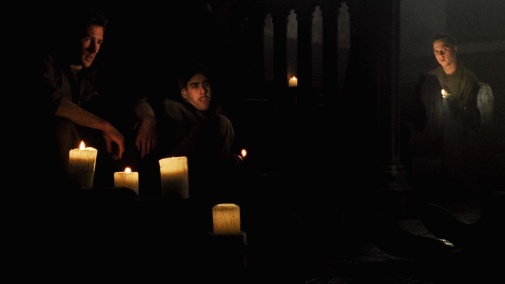
Spielberg opened his movie in the summer, while the future Best Picture winner waited until a December premiere, right in time to be on everyone's mind come Oscar voting. Then again, one can lay such strategic release decisions on Weinstein's feet, too. Going further into the weeds, it makes me uncomfortable to realize that part of my objections to Ryan's masterpiece status overlap with some of the badmouth lines Weinstein fed voters. Chiefly, that the D-Day sequence was great, but the rest of the movie failed to keep up.
In summation, the degree to which that odious man's campaign playbook led to a popular delegitimization of the awards can't be overstated, his influence hard to shake for the foreseeable future.
However, I personally refuse to condemn such fantastic cinema as Shakespeare in Love, The Piano or Carol, among others, because of this one individual. If you have other principles, that's valid, I understand and support you. Even so, regardless of your ultimate moral position, those who love cinema must mourn how polemic grew to mythic proportions, slotting each picture into narrative roles that overshadow their merits and demerits, their complexity as works of art.
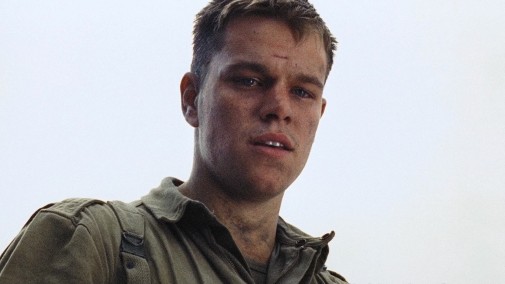
Spielberg's war picture became the slain David to Miramax's Goliath, the defeated hero against a villain wearing an unjustly-won crown in total perversion of mythic sense. In some twisted ways, Shakespeare In Love vs. Saving Private Ryan was the Barbenheimer of 1998. Only it wasn't a box office phenomenon. Instead, it was a race for gold, playing out in the awards season rather than in theaters proper, voters the adjudicators of legacy where audiences hold power in this year's viral story. Unlike the Gerwig-Nolan of it all, the '98 Oscar wars never developed in a mutually beneficial symbiosis, remaining adversarial and heartily contested forevermore.
At the end of all this, dear reader, what say you? Was Saving Private Ryan robbed or not?



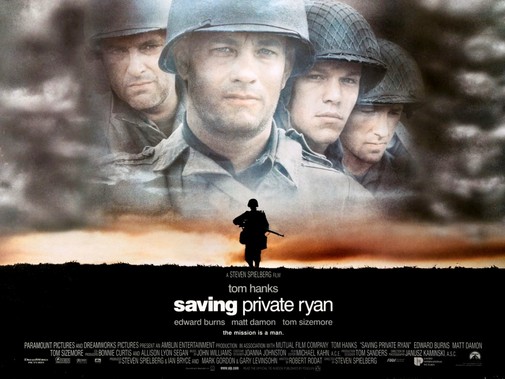
Reader Comments (15)
Agree that the Thin Red Line is clearly superior to both of these. That said..
There is no doubt in my mind that Saving Private Ryan should've won Best Pic over Shakespeare in Love. The landing sequence, the ace performances across the board, some of the more powerfully quiet moments (Matt Damon talking about the last time his brothers were together; Hanks revealing he is a teacher; the German soldier whom Jeremy Davies spares returning in the worst way).. just gut punches than nothing in Shakespeare in Love touches (for all of its wit and charm).
My personal belief is that many of the SIL stans really like the idea of something atypical winning Best Pic, and as you say, it's the rare comedy/romance to do so. But you can't discount when something "standard" excels, and SPR excels in many ways.
Looking back though, it's a big goop of bad Oscar wins in the acting categories. Gwyneth, Benigni, Dench (fine but purely a career encapsulation) -- all had much better competition.
Take out that opening 20 minutes and SAVING PVT. RYAN is just an above average film. SHAKESPEARE IN LOVE has wit and savvy.
That said, I would have gone with TRUMAN SHOW - but, that's another discussion
I wasn't rooting for either though I think they are both quality Hollywood entertainment but have never revisited neither,SPR is the better made film though less entertaining.
Hanks was fine but nothing out of the ordinary it's on a par with his work in The Green Mile,Sully,Bridge of Spies or Apollo 13 solid but not spectacular.
My own Picture & Actor ballots went like this
Best Film The Truman Show,Gods and Monsters,Hilary and Jackie,A Simple Plan and The Big Lebowski
Best Actor McKellen who easily wins,Norton,Bridges,Nolte and Ray Winstone for Nil By Mouth.
"Take out a major part of the movie and then the movie isn't as good." Not sure if that's how this works..
Agree that Truman Show, and Jim Carrey, tower above them all among the non-nominated.
While I think The Thin Red Line is still the better film, Saving Private Ryan was indeed robbed of Best Picture. Shakespeare in Love is a fine film but not a film that is like worthy of Best Picture.
Hmmm
I think SPR is head and shoulders above SIL. I also prefer it to the Thin Red Line, which I've always struggled with, to be frank.
The thing with SIL is that it was really over rewarded on the night. Paltrow triumphing over Streep, Watson, Blanchett and Montenegro? Dench over Bates and Redgrave? Art Direction and Costume Design over Elizabeth? I can accept score in the split category days and it was never losing screenplay.
Saving Private Ryan definitely wasn’t robbed. It’s just that Shakespeare In Love was an upset win. But it was the rare time that the Oscars course-corrected for the better. Like Parasite upsetting presumed frontrunner 1917 at the last moment; they made the right call. Just wish the Oscars would do that A LOT more (remember those preposterous years in 2017 & 2019 where all 4 acting winners won everything? Really could have used a lot of course correction).
Shakespeare In Love is a fantastic film. I really can’t deny its charm. I do think 1998 is a pretty weak year for films. My #1 is Todd Solondz’ Happiness. What a bold film, devoid of any of the sanitizing of 2023 cinema.
The Thin Red Line is better, by a considerable margin, than Shakespeare in Love, which is better, by a considerable margin, than Saving Private Ryan. While it has some higher points, overall I honestly think Ryan is a C-level film. I'll grant it some technical achievements and don't mind it winning the Sound Oscars. But it's not in the same league as The Thin Red Line, and Toll losing was a travesty.
Sure, film fans are still debating this epic battle for Best Picture. However, the real story is the overt resentment that Hollywood holds for Steven Spielberg. While these insiders applaud his cinematic achievements, they also hold a deep and abiding grudge for his on-going financial domination of the box office.
It began when the under 30 year old director delivered the thrilling summer blockbuster Jaws. Despite great reviews and tremendous box office, Oscar voters denied Spielberg a nomination as Best Director. Even then it felt like a stinging rebuke of an upstart who bested his more experienced peers.
The next insult came with Spielberg's next project. Though Spielberg declined the opportunity to make Jaws 2 for the smash hit Close Encounters of the Third Kind, he was rewarded with a Best Director nod but the film was subbed for Best Picture.
In 1981 he delivered the one two punch of Raiders of the Lost Ark and then ET the Extra Terrestrial the following year. The thrilling Indiana Jones tribute to the serials of the Golden Age of Hollywood lost the Oscar to a rather dull sports flick with a memorable theme, Chariots of Fire. That Spielberg masterpiece ET The Extra Terrestrial lost to the earnest (but a long sit) bio pic Ghandi.
Spielberg was again snubbed for a Best Director nomination for the 11 times nominated The Color Purple in 1985. He won two Best DIrector prizes in close succession in the 1990s for Schindler's List and Saving Private Ryan. A handful of nominations since but no winning total close to John Ford who Spielberg famously paid tribute to in The Fabelmans.
The question should be, "Why is anyone surprised that Saving Private Ryan failed to win Best Picture?" The evidence is clear. There is a resentment of Spielberg's success and thus he loses more than he should.
What a meh year at the Oscars.
You know which film should have won Picture, Director, Screenplay, Actor and Actress?
OUT OF SIGHT.
Finbar, I don't really track your analysis. It was an insult when Jaws was nominated for Best Picture but not Best Director but it was also an insult when Spielberg was nominated for Best Director for Close Encounters but the film was not nominated for Best Picture? Is the only way to avoid insulting the master for him and his films to be nominated every time and win every award?
The idea that the Academy "resents" someone with 8 Best Director noms and 2 wins, and 14 films nominated for Best Picture seems like quite a stretch. Does the Academy resent Martin Scorsese? He's only won once...
Shakespeare in Love Forever.
Frankly I am sick and tired of people sh#*%ing all ove SIL. What a fantastic, literate, wonderful film this is! As Charlton Heston said at the time - and I'm paraphrasing here - "SPR is a fine film but films as good as SIL come around once a decade or so."
Mr Ripley79 -- Oh, I love to read other folk's ideal Oscar ballots. Here are my picks from 1998's Oscar eligibility list in those two categories:
*Best Picture*
OUT OF SIGHT
SHAKESPEARE IN LOVE
THE THIN RED LINE
THE TRUMAN SHOW
VELVET GOLDMINE (winner)
*Best Actor*
Christian Bale, VELVET GOLDMINE
Jeff Bridges, THE BIG LEBOWSKI
Ian McKellen, GODS AND MONSTERS (winner)
Nick Nolte, AFFLICTION
Edward Norton, AMERICAN HISTORY X
Honorable Mention: Jim Carrey, THE TRUMAN SHOW & Ray Winstone, NIL BY MOUTH